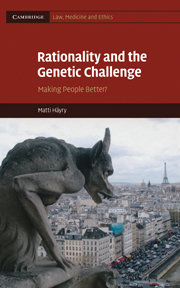Book contents
- Frontmatter
- Contents
- Preface
- 1 Seven ways of making people better
- 2 Rational approaches to the genetic challenge
- 3 The best babies and parental responsibility
- 4 Deaf embryos, morality, and the law
- 5 Saviour siblings and treating people as a means
- 6 Reproductive cloning and designing human beings
- 7 Embryonic stem cells, vulnerability, and sanctity
- 8 Gene therapies, hopes, and fears
- 9 Considerable life extension and the meaning of life
- 10 Taking the genetic challenge rationally
- Bibliography
- Index
1 - Seven ways of making people better
Published online by Cambridge University Press: 05 July 2014
- Frontmatter
- Contents
- Preface
- 1 Seven ways of making people better
- 2 Rational approaches to the genetic challenge
- 3 The best babies and parental responsibility
- 4 Deaf embryos, morality, and the law
- 5 Saviour siblings and treating people as a means
- 6 Reproductive cloning and designing human beings
- 7 Embryonic stem cells, vulnerability, and sanctity
- 8 Gene therapies, hopes, and fears
- 9 Considerable life extension and the meaning of life
- 10 Taking the genetic challenge rationally
- Bibliography
- Index
Summary
In this chapter, I introduce the practical themes examined in the book. After some preliminary remarks concerning the challenges that nature and scientific developments produce, I describe the topics of the subsequent chapters and identify, one by one, the main ethical questions to which they give rise.
The genetic challenge
Humankind is challenged in its pursuit of happiness and wellbeing by three intertwined forces. The first is nonhuman nature. The natural environment sets limits and conditions to our actions, and we have for millennia created strategies to adapt to and to overcome these. On many occasions, our attempts to control nature have resulted in further problems, which have had to be dealt with separately. The second force is human nature in its psychological and social forms. We live, of necessity, in communities and wider societies, and to ensure their smooth operation we have devised a variety of political rules and arrangements. The systems produced have often generated unwanted friction and strife, which have had to be settled with new or additional procedures. The third force to be reckoned with is human nature in its biological sense. We are vulnerable to illness, injury, and death, and to counteract and postpone these we have established many kinds of healing and caring professions. Since their practices have sometimes been seen as futile or detrimental, ways have had to be found to regulate and reorganise them.
- Type
- Chapter
- Information
- Rationality and the Genetic ChallengeMaking People Better?, pp. 1 - 23Publisher: Cambridge University PressPrint publication year: 2010



